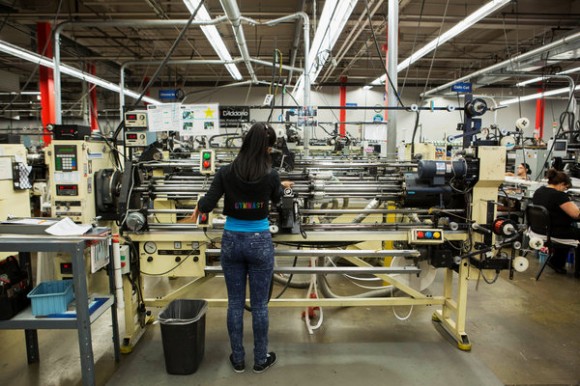 D’Addario Makes Instrument Strings on Long Island
D’Addario Makes Instrument Strings on Long Island
The words “I’m not that interested in guitars” sound strange coming from Pat Metheny, a 20-time Grammy-winning guitarist. But he can explain.
“Musical instruments are just tools,” Mr. Metheny said recently inside the 110,000-square-foot headquarters of the instrument string manufacturer D’Addario, in Farmingdale. “My awareness of them is fairly limited. What I care about is their results.”
That includes a certain “brightness” of sound, he added, as well as consistency. “If the string gauge was off even a millimeter on my guitar, I’d know it in a fraction of a second,” he said. Mr. Metheny had taken time off this fall from a tour of more than 200 cities to shoot an instructional video at the factory. “And if the strings didn’t feel the same as they always do, I would know that in a fraction of a second, too,” he said. “It’s a critical detail.”
Since the 1970s, when Mr. Metheny started using D’Addario strings exclusively, he has counted on the manufacturer to attend to such details. Now he is one of more than 3,000 artist-endorsers. He is also, in a sense, an adviser.
“They’ve kept the dialogue open, and they’ve kept improving the machinery,” he said. “You feel like, ‘These guys are actually listening to me.’ ”
Jim D’Addario, the chief executive of the company, nurtures close ties with musicians, who often visit the nondescript premises to tour or shoot videos. For the company, the artists add prestige to the brand, but they also improve the quality of the 700,000 fretted and bowed instrument strings a day that it produces on Long Island. The strings are sold at retailers like Guitar Center and Sam Ash, at independent stores, online and directly to instrument-makers around the globe.
“You can’t really have a music store without something from this factory,” Mr. D’Addario said.
And that is true whether or not a music store caters to string musicians. Though it is known for guitar strings, D’Addario has recently expanded into producing drumheads, drumsticks, reeds and mouthpieces. Drummers likeAnton Fig, who plays with Paul Shaffer’s house band on “The Late Show With David Letterman,” and Glenn Kotche, drummer for the band Wilco, have worked with Mr. D’Addario to improve the drum products.
“We’ve developed relationships with musicians who are good at giving justifiable, scientific feedback,” he said during a tour of the cavernous factory. Around him, the din of more than 200 string-winding machines and the workers who presided over them set a scene of brisk productivity.
For some local musicians, being one of the 820 or so employees at the Farmingdale headquarters is a boon to their craft. Nick Spadafora, a production assistant from Hauppauge who works on the company’s films, is also the guitarist in the Long Island rock band To Sail Beyond the Sun. For him, the perks of being a D’Addario insider include knowing which strings to use and why. His favorites — the NYXL 11-46 — “really do last longer and sound better than the standard XL strings,” he said.
Despite his access, Mr. Spadafora still marvels at the inner workings of the factory. “Knowing exactly what goes into making the strings, the science of it all, including the research and testing, is pretty amazing to me,” he said. “It’s a really complicated job.”
The history of the D’Addario family business starts in the Abruzzo region of Italy around the 1860s, said Mr. D’Addario. “We were able to trace it back, and they were shepherds and string makers,” for instruments including lutes, harps, guitars and violins. The strings were made out of sheep and hog intestines. “Whatever was in the grass or the air or the atmosphere made for great-sounding gut strings,” he said.
In 1905, Charles D’Addario, Mr. D’Addario’s grandfather, left Italy for Queens and began importing the family’s strings. In 1918, he opened a shop in his garage in Astoria, where he made his own gut strings. In the late 1930s, when Charles D’Addario’s son John Sr. had joined the business — by then known as C. D’Addario & Son — the company began making steel strings and nylon core strings for fretted instruments. “DuPont had developed a nylon microfilament for hairbrushes, toothbrushes and brooms,” Mr. D’Addario said. His father and grandfather thought the material was perfect for harp strings and the treble strings on classical guitars.
Even back then, D’Addario counted on artist feedback: Carlos Salzedo, a famous harpist and a friend to Charles, offered his advice on how to work with the new DuPont material. Throughout the 1940s and ’50s the company continued to perfect and sell its nylon strings. In the 1960s, John D’Addario Sr. developed the first nickel-plated steel alloy, engineering round-wound electric guitar strings that contributed to the rock ’n’ roll sound for the next four decades, Mr. D’Addario said.
From 1959 through the early ’70s, the company flirted with a name change, to Darco Strings, and it was briefly acquired by another company, C. F. Martin & Company. Neither idea had much staying power, so the company relocated from Queens to Long Island, opening its first factory in Lynbrook in 1973. Steady growth brought it to the current premises in 1994.
Now, in addition to the large factory building that houses the on-site studio visited by Mr. Metheny, the company occupies a 50,000-square-foot raw wire mill across the street. That same building houses both the mill and D’Addario’s drumhead factory, where 8,000 drumheads a day are produced. There are also D’Addario factories in California, Texas, Tennessee and Connecticut.
Worldwide, the fleet of D’Addario employees has ballooned to 1,100. But to Mr. D’Addario, the business still feels intimate. “It’s a family business, no matter how big we get,” he said.
